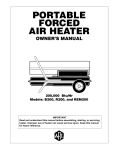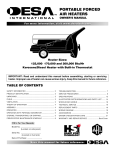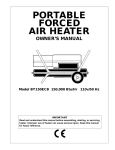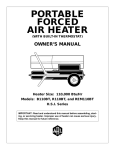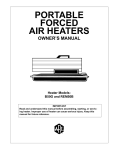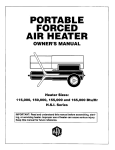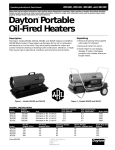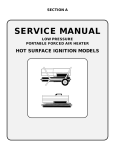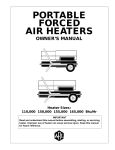Download Dayton 3VG79 Operating instructions
Transcript
3VG79 Operating Instructions & Parts Manual Please read and save these instructions. Read carefully before attempting to assemble, install, operate or maintain the product described. Protect yourself and others by observing all safety information. Failure to comply with instructions could result in personal injury and/or property damage! Retain instructions for future reference. Dayton Portable Forced Air Heaters ® Description Unpacking Dayton Model 3VG79 is a 200,000 Btu/Hr heater. This heater uses Kerosene or #1 fuel oil for combustion and electricity to run the motor. It is primarily intended for indoor or outdoor temporary heating of buildings under construction, alteration, or repair. It may be used in agricultural, industrial, and commercial environments. 1. Remove all packing items applied to heater for shipment. 2. Remove all items from carton. 3. Check items for shipping damage. If heater is damaged, promptly inform dealer where you bought heater. Figure 1 - Model 3VG79 ® G 004 ARL LOGO ELECTRICAL SPECIFICATIONS Model Electrical Input Amperage (during normal run) 3VG79 120 Volt/60 Hertz 4.5 GENERAL SPECIFICATIONS Model Output Rating Btu Fuel Fuel Tank Capacity (U.S. Gallons) Fuel Consumption (U.S. Gallons/Hr.) Motor RPM 3VG79 200,000 Kerosene or No. 1 fuel oil 13.5 1.4 3450 Model Fuel Pump Pressure (PSI) Heater Weight (Pounds - with fuel) Heater Weight (Pounds - without fuel) Spark Plug Gap (Inches) 3VG79 6 77 66 .110 Form 5S4068 © 1997 W.W. Grainger, Inc. Printed in U.S.A. 03430 0895/206/VCPVP ® Version B - For Reduction G016.J 3VG79 Dayton Operating Instructions and Parts Manual Dayton Portable Oil-Fired Heaters ® Product Identification Hot Air Outlet Upper Shell Fan Guard Lower Shell Fuel Cap Fuel Tank Side Cover Flame-out Control Reset Button Figure 2 - Model 3VG79 2 Power Cord Dayton Operating Instructions and Parts Manual Model 3VG79 General Safety Information Make certain you read and understand all warnings. Keep these instructions for reference. They are your guide to safe and proper operation of this heater. Safety information appears throughout these instructions. Pay close attention to them. Below are definitions for the safety information listed throughout this manual. Under this heading, installation, operating and maintenance procedures or practices will be found that, if not carefully followed, WILL result in IMMEDIATE serious personal injury or death. Under this heading, installation, operating, and maintenance procedures or practices will be found that, if not carefully followed, COULD result in severe personal injury or death. Under this heading, installation, operating, and maintenance procedures or practices will be found that, if not carefully followed, COULD result in minor personal injury, product or property damage. IMPORTANT: Every possible circumstance that might involve a hazard cannot be anticipated. The warnings in this manual and on tags or decals affixed to the unit are therefore not all-inclusive. If a procedure, work method, or operating technique not specifically recommended by Dayton is used, you must make sure it is safe for you and others. You should also ensure that equipment will not be damaged or made unsafe by the operating or maintenance method you choose. Carbon monoxide poisoning may lead to death! Carbon monoxide poisoning: Early signs of carbon monoxide poisoning resemble the flu, with headaches, dizziness, and or nausea. If you have these signs, the heater may not be working properly. Get fresh air at once! Have heater serviced. Some people are more affected by carbon monoxide than others. These include pregnant women, people with heart or lung disease or anemia, those under the influence of alcohol, and those at high altitudes. Improper use of this heater can cause serious injury or death from burns, fire, explosion, electrical shock, and carbon monoxide poisoning. Make certain you read and understand all warnings. Keep these instructions for reference. They are your guide to safe and proper operation of this heater. • Use only kerosene or No. 1 fuel oil to avoid risk of fire or explosion. Never use gasoline, naphtha, paint thinners, alcohol, or other highly flammable fuels. • Fueling a) Personnel involved with fueling shall be qualified and thoroughly familiar with the manufacturer's instructions and applicable federal, state, and local regulations regarding the safe fueling of heating units. b) Only the type of fuel specified on the heater's data plate shall be used. c) All flame, including the pilot light, if any, shall be extinguished and the heater allowed to cool, prior to fueling. d) During fueling, all fuel lines and fuel-line connections shall be inspected for leaks. Any leaks shall be repaired prior to returning the heater to service. e) At no time shall more than one day's supply of heater fuel be stored inside a building in the vicinity of the heater. Bulk fuel storage shall be outside the structure. f) All fuel storage shall be located a minimum of 25 feet from heaters, torches, welding equipment, and similar sources of ignition (exception: the fuel reservoir integral with the heater unit). g) Whenever possible, fuel storage shall be confined to areas where floor penetrations do not permit fuel to drip onto or be ignited by a fire at lower elevation. h) Fuel storage shall be in accordance with the federal, state, or local authority having jurisdiction. • Never use heater where gasoline, paint thinner, or other highly flammable vapors are present. • Follow all local ordinances and codes when using heater. • Heaters used in the vicinity of tarpaulins, canvas, or similar enclosure materials shall be located a safe distance from such materials. The recommended minimum safe distance is 10 feet. It is further recommended that these enclosure materials be of a fire retardant nature. These enclosure materials shall be securely fastened to prevent them from igniting or from upsetting the heater due to wind action. ® 3 Version B - For Reduction G016.J 3VG79 Dayton Operating Instructions and Parts Manual Dayton Portable Oil-Fired Heaters ® General Safety Information (Continued) • Use only in well-vented areas. Provide at least three square feet of fresh, outside air for each 100,000 Btu/Hr of rating. This heater produces carbon monoxide, which is listed by the State of California as a reproductive toxin under Proposition 65. • Use only in places free of flammable vapors or high dust content. • Use only with the electrical voltage and frequency specified on model plate. • Use only a three-prong, grounded extension cord. • Minimum heater clearances from combustibles: Outlet: 8 Ft. Sides: 4 Ft. Top: 4 Ft. Rear: 4 Ft. Theory of Operation Fuels The Fuel System: The air pump forces air through the air line. The air is then pushed through the burner head nozzle. This air causes fuel to lift from the tank. A fine mist of fuel is sprayed into the combustion chamber. Use only kerosene or No. 1 fuel oil to avoid risk of fire or explosion. Never use gasoline, naphtha, paint thinners, alcohol, or other highly flammable fuels. The Air System: The motor turns the fan. The fan pushes air into and around the combustion chamber. This air is heated and provides a stream of clean, hot air. The Ignition System: The electronic ignitor sends voltage to the spark plug. The spark plug ignites the fuel and air mixture. The Flame-out Control System: This system causes the heater to shut down if the flame goes out. • Locate heater on a stable and level surface while hot or running or a fire may occur. • clogged fuel filter and nozzle • carbon buildup on spark plug • the need of nontoxic anti-icer in fuel during very cold weather IMPORTANT: Use a KEROSENE ONLY container. Be sure storage container is clean. Foreign matter such as rust, dirt, or water will cause the flame-out control to shut down heater. Foreign matter may also require you to clean fuel system often. Motor Combustion Chamber • When moving or storing heater, keep heater in a level position or fuel spillage may occur. • Keep children and animals away from heater. Do not use heavy fuels such as No. 2 fuel oil or No. 2 Diesel. Using heavy fuels will result in: Spark Plug Burner Head Fan Air Pump Air Intake Filter Clean Heated Air Out Cool Air In • Unplug heater when not in use. Air Output Filter • When used with thermostat, heater may start anytime. • Never use heater in living or sleeping areas. • Never block air inlet (rear) or air outlet (front) of heater. • Never move, handle, refuel, or service a hot, operating, or pluggedin heater. Fuel Tank Nozzle Air For Fuel System • Never attach duct work to front or rear of heater. Figure 3 - Cross Section Operational View 4 Fuel Filter Air Line To Burner Air For Combustion and Heating Electronic Ignitor Fuel Dayton Operating Instructions and Parts Manual Model 3VG79 Assembly This model is furnished with wheels and handles. Wheels, handles, and the mounting hardware are found in the shipping carton. 5. After all screws are inserted, tighten nuts firmly. TOOLS NEEDED • Medium Phillips Screwdriver • 3/8" Open or Adjustable Wrench • Hammer Ventilation 1. Slide axle through wheel support frame. Install wheels on axle. IMPORTANT: When installing wheels, point extended hub of wheels toward wheel support frame (See Figure 4). Front Handle Hot Air Outlet Rear Handle Screw Fuel Tank Flange Air Inlet Follow the minimum fresh, outside air ventilation requirements. If proper fresh, outside air ventilation is not provided, carbon monoxide poisoning can occur. Provide proper fresh, outside air ventilation before running heater. FRESH AIR OPENING REQUIREMENTS Heater Size Square Feet Opening 200,000 Btu/Hr 6.0 Provide at least a three-square-foot opening of fresh, outside air for each 100,000 Btu/Hr rating. Provide extra fresh air if more heaters are being used. Example: A 200,000 Btu/Hr heater requires one of the following: Wheel Support Frame TO START HEATER 1. Follow all ventilation and safety information. 2. Fill fuel tank with kerosene or No. 1 fuel oil. 3. Attach fuel cap. 4. Plug power cord of heater into threeprong, grounded extension cord. Extension cord must be at least six feet long. EXTENSION CORD WIRE SIZE REQUIREMENTS • 6 to 10 feet long, use 18 AWG rated cord • 11 to 100 feet long, use 16 AWG rated cord • 101 to 200 feet long, use 14 AWG rated cord 5. Plug extension cord into standard 120 volt/60 hertz, three-hole, grounded outlet. Heater will start when extension cord is plugged into outlet. If not, push in flameout control reset button (See Figure 5). Flame-out Control Reset Button • a two-car garage door (16 feet wide opening) raised five inches • a single-car garage door (9 feet wide opening) raised eight inches Nut Axle Cap Nut 4. Place handles on top of fuel tank flange. Insert screws through handles, fuel tank flange, and wheel support frame. Attach nut finger tight after each screw is inserted. Extended Hub Wheel Figure 4 - Wheel and Handle Assembly 2. Place cap nuts on axle ends. Gently tap with hammer to secure. 3. Place heater on wheel support frame. Make sure air inlet end (rear) of heater is over wheels. Line up holes on fuel tank flange with holes on wheel support frame. • two windows (30 inches wide opening) raised fifteen inches Operation Review and understand the warnings in the Safety Information Section. They are needed to safely operate this heater. Follow all local codes when using this heater. Figure 5 - Flame-out Control Reset Button TO STOP HEATER 1. Unplug extension cord from outlet. TO RESTART HEATER 1. Wait two minutes after stopping heater. 2. Repeat steps under To Start Heater. ® 5 Version B - For Reduction G016.J 3VG79 Dayton Operating Instructions and Parts Manual Dayton Portable Oil-Fired Heaters ® Maintenance Air Intake Filter 5. Dry fan thoroughly. Never service heater while it is plugged in, operating, or hot. Severe burns and electrical shock can occur. UPPER SHELL REMOVAL 6. Replace fan on motor shaft. Place fan hub flush with end of motor shaft (See Figure 7). Fan Guard Fan 1. Remove screws along each side and top of heater using 5/16" nut-driver. These screws attach upper and lower shells together (See Figure 6). Lint Filter Motor Air Output Filter 2. Lift upper shell off. Flush 3. Remove fan guard. Upper Shell Filter End Cover Figure 8 - Air Output, Air Intake, and Lint Filters PUMP PRESSURE ADJUSTMENT Screw Fan Guard Motor Shaft 1. Remove pressure gauge plug from filter end cover. Setscrew 2. Install accessory pressure gauge (part number HA1180). Figure 7 - Fan Cross Section 8. Replace fan guard and upper shell. 4. Adjust pressure to 6.0 PSI. Turn relief valve to right to increase pressure. Turn valve to left to decrease pressure (See Figure 10, page 7). AIR OUTPUT, AIR INTAKE, AND LINT FILTERS 5. Stop heater. Remove pressure gauge. Replace pressure gauge plug in filter end cover. 7. Place setscrew on flat of shaft. Tighten setscrew firmly (40-50 inches-pounds). Figure 6 - Upper Shell Removal FAN IMPORTANT: Remove fan from motor shaft before removing motor from heater. The weight of the motor resting on the fan could damage the fan pitch. 3. Start heater (See Operation, page 5). Allow motor to reach full speed. 1. Remove upper shell (See Figure 6). 2. Remove filter end cover screws using 5/16" nut-driver. Relief Valve Pressure Gauge Plug 3. Remove filter end cover. 1. Remove upper shell (See Figure 6). 4. Replace air output and lint filters. 2. Use 1/8" allen wrench to loosen setscrew which holds fan to motor shaft. 5. Wash or replace air intake filter (See Preventative Maintenance Schedule, page 9). 3. Slip fan off motor shaft. 6. Replace filter end cover. 4. Clean fan using soft cloth moistened with kerosene or solvent. 7. Replace fan guard and upper shell. IMPORTANT: Do not oil filters. 6 Figure 9 - Pressure Gauge Plug Removal Dayton Operating Instructions and Parts Manual Model 3VG79 Maintenance (Continued) Bushing, Lower Fuel Line, and Fuel Filter 7. Attach new fuel valve to bracket with 2 existing screws. Pressure Gauge 8. Install new fuel valve and bracket on lower shell. 9. Connect wiring and upper and lower fuel lines to fuel valve. Make sure green ground wire is connected to correct terminal (See Figure 12). 10. Replace fan, fan guard, upper shell, and side cover. SPARK PLUG Figure 10 - Adjusting Pump Pressure Fuel Valve Fitting Side Cover FUEL FILTER 1. Remove upper shell (See Figure 6, page 6). 2. Remove fan (See page 6). 1. Remove side cover screws using 5/16" nut-driver. 2. Remove side cover (See Figure 11). 3. Pull lower fuel line off the fuel valve fitting. 4. Carefully pry bushing, lower fuel line, and fuel filter out of fuel tank. 5. Wash fuel filter with clean fuel and replace in tank. 6. Attach lower fuel line to fuel valve fitting. 7. Replace side cover. FUEL VALVE Figure 11 - Fuel Filter Removal 4. Disconnect 3 electrical wires from fuel valve. Note location of green ground wire (See Figure 12). Burner Head Spark Plug Wire 5. Using 1/4" nut driver remove 2 screws holding fuel valve and bracket to lower shell (See Figure 12). Save these screws. 6. Using 1/4" nut driver remove 2 screws holding fuel valve to bracket. Save these screws Wave Spring Washer Spark Plug Terminal for Green Ground Wire Screw Figure 13 - Spark Plug Removal Valve Fuel Valve Fittings Electrical Wires 1. Remove side cover (See Figure 11), fan guard, and upper shell (See Figure 6, page 6) screws using 5/16" nut-driver. Green Ground Wire 2. Remove fan (See Fan, page 6). Bracket Screw 3. Pull lower fuel line off the fuel valve fitting (See Figure 12). High Voltage. 3. Remove spark plug wire from spark plug. 4. Remove spark plug and wave spring washer from burner head using 13/16" open-end wrench. 5. Clean and regap spark plug electrodes to .110 gap. Bend Here to Adjust Gap Gap Lower Fuel Line Figure 12 - Fuel Valve Replacement Figure 14 - Spark Plug Gap ® 7 Version B - For Reduction G016.J 3VG79 Dayton Operating Instructions and Parts Manual Dayton Portable Oil-Fired Heaters ® Maintenance (Continued) 6. Install spark plug and wave spring washer in burner head. Torque 40 to 60 inch-pounds. Then adjust (if necessary) to bring side electrode into the acceptable range (See Figure 15). Combustion Chamber Burner Head Spark Plug Wire Screw 9. Blow compressed air through face of nozzle. This will free any dirt in nozzle area. 10. Inspect nozzle seal for damage. 11. Replace nozzle into burner head and tighten firmly (80-110 inch-pounds). 12. Attach burner head to combustion chamber. Side Electrode 13. Install spark plug in burner head. Spark Wave Spring Plug Washer 270° Acceptable Range For Side Electrode 270˚ ACCEPTABLE RANGE FOR SIDE ELECTRODE Fuel Line Hose Air Line Hose Figure 15 - Acceptable Range For Side Electrode 7. Attach spark plug wire to spark plug. 8. Replace fan (See page 6). 9. Replace fan guard and upper shell. NOZZLE 1. Remove upper shell (See page 6). 2. Remove fan (See page 6). 14. Attach spark plug wire to spark plug. 15. Attach fuel and airline hoses to burner head. 16. Replace fan (See page 6). 17. Replace fan guard and upper shell. PUMP ROTOR Figure 16 - Removing Burner Head 7. Place burner head into vise and lightly tighten. 8. Carefully remove nozzle from burner head using 5/8" socket wrench (See Figure 17). Nozzle Face (Procedure if rotor is binding) 1. Remove upper shell (See page 6). 2. Remove filter end cover screws using 5/16" nut-driver. 3. Remove filter end cover and air filters. 4. Remove pump plate screws using 5/16" nut-driver. Blade Pump Plate Nozzle Seal 3. Remove fuel and air line hoses from burner head. Air Intake Filter Filter End Cover 4. Remove spark plug wire from spark plug. 5. Remove spark plug from burner head using 13/16" open-end wrench. 6. Remove three screws using 5/16" nutdriver and remove burner head from combustion chamber. Insert Nozzle Rotor Air Output Filter Burner Head Air Line Fitting Figure 17 - Removing Nozzle 8 Fuel Line Fitting Fan Guard Figure 18 - Rotor Location Dayton Operating Instructions and Parts Manual Model 3VG79 Maintenance (Continued) 11. Replace fan guard and upper shell. 5. Remove pump plate. 12. Adjust pump pressure (See page 16). 6. Remove rotor, insert, and blades. NOTE: If rotor is still binding, proceed as follows. 7. Check for debris in pump. If debris is found, blow out with compressed air. 8. Install insert and rotor. 9. Check gap on rotor. Adjust to .003"/.004" if needed (See Figure 19). Blade 13. Perform steps 1 through 6 above. 14. Place fine grade sandpaper (600 grit) on flat surface. Sand rotor lightly in “figure 8” motion four times (See Figure 19). Gap Adjusting Screw Sandpaper .003"/.004" Gap Measured With Feeler Gauge NOTE: If shipping, transport companies require fuel tanks to be empty. 1. Drain fuel tank. NOTE: This model has a drain plug on underside of fuel tank. Remove drain plug to drain all fuel. Be sure all fuel is removed. 2. Replace drain plug. 3. If any debris is noted in old fuel, add 1 or 2 quarts of clean kerosene to tank, stir, and drain again. This will prevent excess debris from clogging filters during future use. 4. Replace fuel cap and drain plug. Properly dispose of old and dirty fuel. Check with local automotive service stations that recycle oil. Rotor Gap Adjusting Screw Figure 20 - Sanding Rotor Figure 19 - Gap Adjusting Screw Locations NOTE: Rotate rotor one full turn to insure the gap is .003"/.004" at tightest position. Adjust if needed. STORING, TRANSPORTING, OR SHIPPING 15. Reinstall insert and rotor. 16. Perform steps 10 through 12 above. 10. Install blades, pump plate, air filters, and filter end cover. 5. If storing, store heater in dry place. Make sure storage place is free of dust and corrosive fumes. IMPORTANT: Do not store kerosene over summer months for use during next heating season. Using old fuel could damage heater. Preventative Maintenance Schedule Never service heater while it is plugged in, operating, or hot. Severe burns and electrical shock can occur. How Often How To Fuel tank Flush every 150-200 hours of operation or as needed. Air output and lint filters Air intake filter Replace every 500 hours of operation or once a year. See Storing, Transporting, or Shipping, above. See Air Output, Air Intake, and Lint Filters, page 6. See Air Output, Air Intake, and Lint Filters, page 6. See Fuel Filter, page 7. See Spark Plug, page 7. See Fan, page 6. Item Fuel filter Spark plug Fan blades Motor Wash and dry with soap and water every 500 hours of operation or as needed. Clean twice a heating season or as needed. Clean and regap every 600 hours operation or replace as needed. Clean every season or as needed. Not required/permanently lubricated. ® 9 Version B - For Reduction G016.J 3VG79 Dayton Operating Instructions and Parts Manual For Replacement Parts, call 1-800-323-0620 24 hours a day - 365 days a year Dayton Portable Oil-Fired Heaters ® Please provide following information: -Model number -Serial number (if any) -Part description and number as shown in parts list 1 2 3 Address parts correspondence to: Grainger Parts Operations P.O. Box 3074 1657 Shermer Road Northbrook, IL 60065-3074 U.S.A. 4 5 6 7 8 17 16 9 15 10 11 18 14 Figure 21 - Motor and Pump Assembly 13 12 1 2 8 3 4 7 5 Figure 22 - Burner Head Assembly 6 1 4 6 5 7 4 8 Figure 23 - Fuel Valve Assembly 10 2 3 3VG79 Dayton Operating Instructions and Parts Manual Model 3VG79 Parts List Replacement Motor and Pump Assembly - Figure 21 Ref. No. Description Part Number 1 Motor 102001-07 079975-03 Ref. Ref. No. No. Description Part Part Number Number 1 10 Relief Spring **M10993-1 1 1 11 Adjusting Screw **M27694 1 2 **M22997 1 Qty. 2E510D 2E511D Qty. Qty. Qty. 2 Pump Body 3 Screw, #10-32 x 5/8" 12 Plug 4 Rotor Insert **M22009 1 13 Screw, #10-32 x 1" 5 Pump Rotor **M22456-2 1 14 Output Filter **M12244-1 1 6 Pump End Cover M50545 1 15 Lint Filter **M11637 1 7 Intake Filter **M12179 1 16 Barb Fitting 8 Filter End Cover 1 17 Blade 9 Steel Ball, 1/4" Diameter 1 18 Screw, #10-32 x 1.12" Ref. Ref. No. No. Description Part Part Number Number *FHPF3-6C M16545-02 **M8940 *M12461-31 4 M50820-02 1 **M8643-2 4 *M12461-32 6 (*) Standard hardware item, available locally. (**) See MAINTENANCE KITS, page 14. Burner Head Assembly - Figure 22 Ref. No. Description Part Number 1 Nozzle 100735-13 1 5 Burner Head Body M50924-08 2 Nozzle Washer M10659-1 2 6 Barb Fitting M50820-02 2 3 Nozzle Spring M10809-1 1 7 Spark Plug HA3012 1 4 Nozzle Sleeve M8882 1 8 Wave Spring Washer 103409-01 1 Ref. Ref. No. No. Description Part Part Number Number Qty. 2E510D 2E511D Qty. Qty. Qty. 1 Fuel Valve Assembly - Figure 23 Ref. No. Description Part Number 1 Fuel Valve 103128-01 1 5 Hex TPG Screw, 8-18 x 3/8" *M11084-38 2 2 Fuel Valve Bracket 103129-01 1 6 Wire Assembly, Red 079010-31 1 3 Hex Head Screw, 3-32 x 1/4" *M12461-13 2 7 Wire Assembly, White 079010-32 1 4 Fitting Barb 2 8 Fuel Valve Ground Wire M16841-62 1 M50820-02 Qty. 2E510D 2E511D Qty. Qty. Qty. (*) Standard hardware item, available locally. ® 11 Version B - For Reduction G016.J 3VG79 Dayton Operating Instructions and Parts Manual For Replacement Parts, call 1-800-323-0620 24 hours a day - 365 days a year Dayton Portable Oil-Fired Heaters ® Please provide following information: -Model number -Serial number (if any) -Part description and number as shown in parts list Address parts correspondence to: Grainger Parts Operations P.O. Box 3074 1657 Shermer Road U.S.A. Northbrook, IL 60065-3074 2 1 3 4 6 46 7 9 10 47 39 5 8 23 16 14 11 19 13 24 12 28 15 45 23 43 25 17 26 44 21 30 27 29 22 38 20 18 37 31 40 32 42 35 33 34 36 41 Figure 24 - Replacement Parts Illustration for Model 3VG79 12 3VG79 Dayton Operating Instructions and Parts Manual Model 3VG79 Parts List Replacement Ref. No. Description 1 Upper Shell 2 Screw, #10-16 x 1/2" Part Number 098511-227 *100647-01 Ref. No. Qty. Description Part Number Qty. 1 25 Bushing M50104-03 2 8 26 Bushing M50104-01 2 3 Combustion Chamber 098512-48 1 27 Screw, #10-16 x 1/2" 4 Photocell Bracket 099229-01 1 28 Clip Nut 5 Screw, #6-32 x 3/8" *M10908-2 2 29 Screw, #8-32 x 3/8" 6 Photocell Assembly HA3019 1 30 Fuel Tank 7 Burner Head Assembly † 1 31 Fuel Cap (Includes Gasket) 097702-01 1 8 Screw, #10-16 x 1/2" *M11084-27 3 32 Flame-out Control HA3003 1 9 Fan 102042-01 1 33 Strain Relief Bushing M11143-1 1 † 1 34 Power Cord 098219-19 1 M50631 2 35 Side Cover 102562-01AA 1 *M11084-27 6 M11271-8 8 *M10908-14 1 098513-86 1 10 Motor and Pump Assembly 11 Rubber Bumper 12 Motor Mounting Bracket 101206-01 1 36 Screw, #10-16 x 1/2" *M11084-27 4 13 Solid State Relay 097061-01 1 37 Terminal Board 099125-12 1 14 Screw, #8-18 x 1/2" *M15823-39 2 38 Rivet 099157-01 1 15 Hex Lock Nut, 1/4-20 *NTC-4C 2 39 Wire Assembly (Red, 18") 079010-20 1 16 Fan Guard 102756-01 1 40 Wire Assembly (Red, 6") M16841-57 1 17 Ignitor Kit 102482-01 1 41 Drain Plug (Includes “o” Ring) M27417 1 18 Screw, #10-16 x 3/4" *M11084-29 2 42 Hex Nut, 3/8 - 27 *099177-01 1 19 Fuel Line M51345-03 1 43 Rubber Bushing 20 Fuel Filter **M51150-01 1 44 Fuel Valve Assembly 21 Fuel Line Tube M51345-04 1 45 Foam Gasket 097785-04 2 22 Rubber Bushing M10990-3 1 46 Screw, Special 099230-01 2 23 Airline M50814-03 1 47 Screw, #10-16 x 1/2" *M11084-27 2 24 Lower Shell 098511-228 1 103523-01 † 1 1 (*) Standard hardware item, available locally. (**) See MAINTENANCE KITS, page 14. (†) Not available as an assembly, see pages 10 and 11. ® 13 Version B - For Reduction G016.J 3VG79 Dayton Operating Instructions and Parts Manual Dayton Portable Oil-Fired Heaters ® Replacement Parts List for Handle and Wheel Group Ref. No. Description Part Number 1 Handles 2 Screw, #10-24 x 1 3/4" 3 Wheel Support Frame 4 Hex Nut, #10-24 5 Wheel 079023-01 2 6 Cap Nut M28526 2 7 Axle M16801-2 1 ∆ ∆ ∆ General Information Decal 098493-01 1 Tradename Decal 097409-13 2 Combustion Chamber Grounding Wire M9900-192 1 1 Qty. HA2204 2 2 *M12345-33 8 M12831-3 1 *NTC-3C 8 3 5 (*) Standard hardware item, available locally. 4 6 (∆) Not shown. 7 Figure 25 - Handle and Wheel Assembly Accessories Maintenance Kits Part Numbers Part Numbers Air Gauge Kit Hang-up Thermostat kit Flame-out Control/Photocell Tester Fuel Tank Filter Screen HA1180 Flame-out Control HA3003 HA1210 Spark Plug HA3012 HA1170 Filter Kit (M11637, M12179, M12244-1, M51150-01) HA3017 HA2210 Nozzle 100735-13 Rotor/Air Pump Kit (M22456-2, M22009, M8643-2) HA3005 Handle HA2204 Photocell HA3019 Wiring Diagram Pump Adjustment (M27694, M10993-1, M22997, Power Plug 120V/60Hz White M8940) Black Green White White Green Motor Green/Yellow Ignitor Spark Plug Red Terminal Board Red Black Relay B White White Red Blue Blue White Red Red Flame-Out Control Reset Button Photocell Green R Solenoid Valve Figure 26 - Wiring Diagram 14 HA3020 Dayton Operating Instructions and Parts Manual Model 3VG79 Troubleshooting Chart Never service heater while it is plugged in, operating, or hot. Severe burns and electrical shock can occur. Symptom Possible Cause(s) Corrective Action Heater ignites, but flame-out control shuts off heater after a short period of time 1. Wrong pump pressure 1. See Pump Pressure Adjustment, page 6 2. Dirty air output, air intake and lint filters 2. See Air Output, Air Intake and Lint Filters, page 6 3. Dirty fuel filter 3. See Fuel Filter, page 7 4. Dirt in nozzle 4. See Nozzle, page 8 5. Dirty photocell lens 5. Clean photocell lens 6. Bad flame-out control 6. Replace flame-out control 1. Wrong pump pressure 1. See Pump Pressure Adjustment, page 6 2. Carbon deposits on spark plug and/or improper gap 2. See Spark Plug, page 7 3. Dirty fuel filter 3. See Fuel Filter, page 7 4. Dirt in nozzle 4. See Nozzle, page 8 5. Water in fuel tank 5. Drain and flush fuel tank with clean kerosene. See Storing, Transporting, or Shipping, page 9 6. Bad fuel valve 6. See Fuel Valve, page 7 Heater will not ignite, but motor runs for a short period of time High Voltage! Motor does not start when heater is plugged in, fan rotates slowly or does not turn 7. Electronic ignitor not grounded 7. Make sure electronic ignitor mounting is tight 8. Bad electronic ignitor 8. Replace electronic ignitor 9. Spark plug not oriented properly 9. See Spark Plug, page 7 1. Flame-out control not reset 1. Press flame-out control reset button 2. Solid state relay not allowed to reset 2. Wait two minutes before trying to restart heater 3. Binding pump rotor 3. If fan is hard to turn, see Pump Rotor, page 8 ® 15 Version B - For Reduction G016.J 3VG79 Dayton Operating Instructions and Parts Manual Dayton Portable Oil-Fired Heaters ® Limited Warranty Dayton One-Year Limited Warranty. Portable Oil-Fired heater, Models covered in this manual, are warranted by Dayton Electric Mfg. Co. (Dayton) to the original user against defects in workmanship or materials under normal use for one year after date of purchase. Any part which is determined to be defective in material or workmanship and returned to an authorized service location, as Dayton designates, shipping costs prepaid, will be, as the exclusive remedy, repaired or replaced at Dayton’s option. For limited warranty claim procedures, see PROMPT DISPOSITION below. This limited warranty gives purchasers specific legal rights which vary from jurisdiction to jurisdiction. Limitation of Liability. To the extent allowable under applicable law, Dayton’s liability for consequential and incidental damages is expressly disclaimed. Dayton’s liability in all events is limited to, and shall not exceed, the purchase price paid. Warranty Disclaimer. Dayton has made a diligent effort to provide product information and illustrate the products in this literature accurately; however, such information and illustrations are for the sole purpose of identification, and do not express or imply a warranty that the products are merchantable, or fit for a particular purpose, or that the products will necessarily conform to the illustrations or descriptions. Except as provided below, no warranty or affirmation of fact, expressed or implied, other than as stated in “LIMITED WARRANTY” above is made or authorized by Dayton. Product Suitability. Many states and localities have codes and regulations governing sales, construction, installation, and/or use of products for certain purposes, which may vary from those in neighboring areas. While Dayton attempts to assure that its products comply with such codes, it cannot guarantee compliance, and cannot be responsible for how the product is installed or used. Before purchase and use of a product, review the product applications and all applicable national and local codes and regulations, and be sure that the product, installation, and use will comply with them. Certain aspects of disclaimers are not applicable to consumer products; e.g., (a) some jurisdictions do not allow the exclusion or limitation of incidental or consequential damages, so the above limitation or exclusion may not apply to you; (b) also, some jurisdictions do not allow limitations on how long an implied warranty lasts, consequently the above limitation may not apply to you; and (c) by law, during the period of this limited warranty, any implied warranties of merchantability or fitness for a particular purpose applicable to consumer products purchased by consumers, may not be excluded or otherwise disclaimed. Prompt Disposition. Dayton will make a good faith effort for prompt correction or other adjustment with respect to any product which proves to be defective within limited warranty. For any product believed to be defective within limited warranty, first write or call dealer from whom product was purchased. Dealer will give additional directions. If unable to resolve satisfactorily, write to Dayton at address below, giving dealer’s name, address, date and number of dealer’s invoice, and describing the nature of the defect. Title and risk of loss pass to buyer on delivery to common carrier. If product was damaged in transit to you, file claim with carrier. Manufactured for Dayton Electric Mfg. Co., 5959 W. Howard St., Niles, Illinois 60714 U.S.A. Manufactured for Dayton Electric Mfg. Co. Niles, Illinois 60714 16 ® 103536-01 Rev. B 3/97 Version B - For Reduction G016.J

















